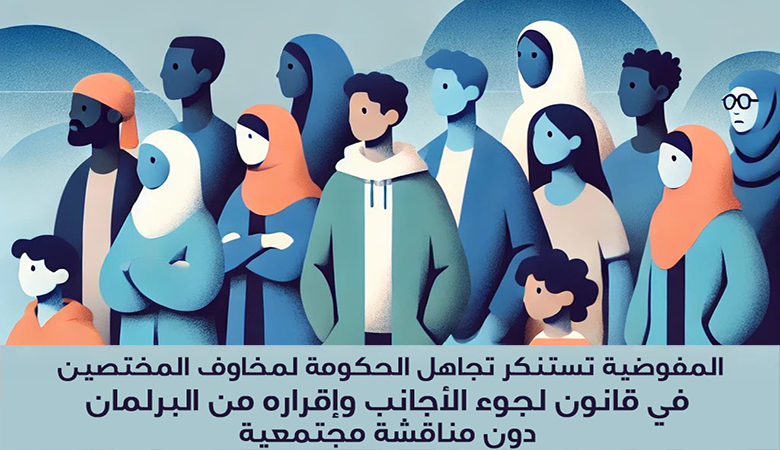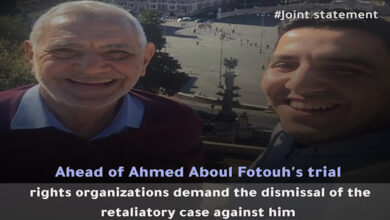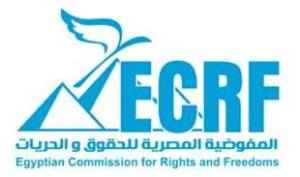المفوضية المصرية للحقوق والحريات تستنكر تجاهل الحكومة المصرية لمخاوف المختصين في قانون لجوء الأجانب وإقراره من البرلمان دون مناقشة مجتمعية
#بيان

English Below
.
تطالب المفوضية المصرية الرئيس المصري، بالتدخل العاجل والفوري والاعتراض على مشروع قانون لجوء الأجانب، باستخدام الصلاحيات الممنوحة له بموجب المادة 123 من الدستور المصري، والتي تخول له حق الاعتراض على مشاريع القوانين التي اقرها مجلس النواب فيما يتعلق بالمواد التي تواجه شبهة عدم دستورية، وتنتهك حقوق اللاجئين الواردة بالمواثيق والعهود الدولية.
وتعرب عن قلقها العميق إزاء استمرار الحكومة المصرية في تجاهل آراء وتخوفات المختصين وأصحاب المصلحة عند صياغة وتمرير التشريعات الهامة، وآخرها قانون لجوء الأجانب الذي تم اعتماده من البرلمان الأسبوع الماضي، رغم التحفظات الجوهرية عليه.
واستمرت الحكومة المصرية في نهجها المعتاد في إعداد مشاريع القوانين بسرية وغياب لأي مشاورة مجتمعية مع الخبراء أو الجهات المختصة، ورغم المناقشات لعام كامل داخل البرلمان لم يتم الكشف عن النصوص المقترحة أو إتاحتها للنقاش العام، مما يعكس غياب الشفافية وانعدام الاعتبار للمصلحة العامة، وفي هذا السياق، تؤكد المفوضية المصرية أن القانون الجديد يحمل في طياته مخاطر كبيرة على حقوق اللاجئين وطالبي اللجوء، أبرزها:
استحداث لجنة دائمة لشئون اللاجئين ذات طابع أمني تتمتع بصلاحيات واسعة تشمل البت في طلبات التسجيل ومنح أو منع صفة اللجوء، هذه اللجنة تحل عمليًا محل المفوضية السامية للأمم المتحدة لشئون اللاجئين (UNHCR)، وهي الجهة الدولية المعترف بها لضمان حقوق اللاجئين، الصلاحيات المطلقة الممنوحة لهذه اللجنة تثير مخاوف من غياب معايير الشفافية والاستقلالية، كما أن تمكين اللجنة من “التفسير الوحيد لتعريف اللاجئ” يتعارض مع التعريف الوارد في اتفاقية جنيف لعام 1951، مما يسمح بإقصاء فئات قد تكون مستحقة للحماية الدولية.
انتهاك الحقوق الدستورية والدولية للاجئين حيث تحتوي مواد القانون على عبارات فضفاضة تمنح السلطات الحق في اتخاذ “تدابير ضرورية” ضد اللاجئين، تشمل الترحيل والاحتجاز والتغريم والابعاد، بذريعة الأمن القومي والنظام العام، هذه الصلاحيات تشكل تهديدًا مباشرًا للحقوق الأساسية المضمونة بموجب الدستور المصري، مثل الحق في عدم الترحيل القسري، كما يتجاهل القانون بذلك الالتزامات الدولية لمصر بموجب اتفاقية جنيف لعام 1951، التي تنص على حماية اللاجئين من الإبعاد أو الإعادة القسرية إلى أماكن قد يتعرضون فيها للخطر.
غياب آليات واضحة للوصول إلى الحقوق الأساسية، حيث يتضمن القانون نصوصًا تعترف ببعض حقوق اللاجئين مثل التعليم، والرعاية الصحية، والعمل، ولكن دون تحديد آليات لتنفيذ هذه الحقوق، فالنصوص غير القابلة للتنفيذ تجعل هذه الحقوق شكلية وغير قابلة للتطبيق، مما يؤدي إلى تفاقم المعاناة الإنسانية، ففي ظل الواقع الحالي، يعاني المواطن المصري نفسه من صعوبة الوصول إلى هذه الخدمات، مما يجعل حصول اللاجئين عليها أكثر تعقيدًا.
استخدام مفهوم الأمن القومي لتبرير الانتهاكات، إذ يتكرر استخدام مصطلحات مثل “الأمن القومي” و”النظام العام” لتبرير التدابير ضد اللاجئين، هذه العبارات الفضفاضة تمنح السلطات مجالًا واسعًا لاتخاذ إجراءات تعسفية ضد اللاجئين وطالبي اللجوء دون رقابة قضائية فعال، وهذا الاستخدام المفرط لذرائع للأمن القومي يؤدي إلى تضييق الخناق على اللاجئين وحرمانهم من حقوقهم المشروعة، ويخلق مناخًا من التمييز والتهميش.
التضييق على المنظمات الدولية والمجتمع المدني، فالقانون يُقصي دور المنظمات الدولية مثل المفوضية السامية لشئون اللاجئين، ويُضعف التعاون مع مؤسسات المجتمع المدني، مما يؤدي إلى غياب آليات رقابية مستقلة، مما يضع اللاجئين تحت رحمة قرارات أمنية أحادية الجانب، كما يتعارض ذلك مع التزامات مصر الدولية بتمكين منظمات الإغاثة والحقوق من ممارسة دورها في حماية اللاجئين.
المخاطر الناتجة عن هذه النصوص كثيرة أهمها زيادة الهجرة غير النظامية، حيث يؤدي التضييق على اللاجئين إلى دفعهم للبحث عن بدائل غير آمنة للهجرة، مما يزيد من المخاطر الإنسانية المرتبطة بها، كذلك تقويض سمعة مصر الدولية لما تشكله هذه النصوص من انتهاكً للاتفاقيات الدولية، مما يعرض مصر لانتقادات واسعة قد تؤثر على علاقاتها الدولية، كما تمنح النصوص غطاءً قانونيًا لانتهاكات محتملة ضد اللاجئين، مما يزيد من معاناتهم ويهدد سلامتهم وأمنهم.
وبناء على ما سبق تستنكر المفوضية المصرية الإصرار على تمرير هذا القانون وتحذر من أخطار تنفيذه على اللاجئين والمجتمع المصري المضيف على حد سواء، كما تعيد المطالبة بما أوصت به سابقا من إعادة صياغة القانون لضمان انسجامه مع التزامات مصر الدستورية والدولية، إشراك أصحاب المصلحة بما في ذلك منظمات المجتمع المدني والخبراء واللاجئون أنفسهم في عملية إعداد التشريعات ذات الصلة، وتعزيز الشفافية عبر نشر مشاريع القوانين للنقاش العام قبل إقرارها.
وفي وقت سابق من الآن، أرسلت مفوضية شئون اللاجئين بالأمم المتحدة، رسائل إلى المسجلين لديها، وحصلت المفوضية المصرية على نسخة من هذه الرسائل، تحاول فيها تهدئة اللاجئين على وضعهم خلال الفترة المقبلة وخاصة بعد ما أثير حول القانون الجديد.
وقالت المفوضية في رسالتها: “نود إعلامكم بأن المفوضية على علم بالأخبار الأخيرة المنشورة في وسائل الإعلام حول مشروع قانون اللجوء، والذي لا يزال قيد العملية التشريعية، ولم يتم التصديق على أي قانون وطني للجوء حتى الآن، لذلك، لا توجد تغييرات في السياق الحالي، وتقوم المفوضية بأنشطتها التسجيلية كالمعتاد سنبقيكم على اطلاع عبر قنوات الاتصال الخاصة”.
خلفية:
في أكتوبر 2024، أرسلت الحكومة المصرية مشروع قانون لجوء الأجانب والمكون من 39 مادة إلى لجنة الدفاع والأمن القومي بمجلس النواب لمناقشته تمهيدا لاعتماده، حيث وافقت عليه اللجنة وأحالته إلى الجلسة العامة بالبرلمان لمناقشته واعتماده.
وفي 20 نوفمبر 2024، أقرت الجلسة العامة بمجلس النواب القانون بشكل رسمي بعدما تم عرضه على النواب بشكل منفصل كل مادة بذاتها، قبل أن تتم الموافقة على جميع مواد القانون، وذلك على الرغم من الاعتراضات المتعددة من منظمات ومؤسسات المجتمع المدني.
ويبلغ عدد اللاجئين المسجلين في مصر لدى مفوضية الأمم المتحدة لشؤون اللاجئين نحو 800 ألف شخص، زاد العدد إلى هذا الحد مع تدفق السودانيين الذين دخلوا إلى مصر عقب اندلاع الحرب في السودان في إبريل عام 2023. لكن الحكومة المصرية تقدر عدد الأجانب والمقيمين على أرضها بنحو 9 ملايين شخص، وتقول إنها تتكلف بإنفاق نحو 10مليارات دولار عليهم سنويا.
وأصدرت المفوضية المصرية في وقت سابق، تعليقها القانوني الذي شمل 19 توصية خاصة بالقانون، مع استنكار إصدار مشروع القانون دون إجراء أي حوار مجتمعي أو مناقشة مع المجتمع المدني أو أصحاب المصلحة، ما اعتبرته المفوضية “استمرارًا من الحكومة في نهجها القائم على التعتيم”. ويرى التعليق القانوني أن المشروع “يفرض قيودًا والتزامات ويعصف بالحقوق مقابل النص على حق في خدمات غير موجودة في الأساس أو يصعب الوصول إليها”.
وطالبت المفوضية بإعادة النظر في القانون بشكل عام، ليس فقط بشأن المواد التي تتيح للحكومة – بصياغتها الحالية – الغلو في انتهاك حقوق اللاجئين والتعسف في استخدام السلطة تجاههم، ولكن أيضًا من حيث التوقيت، وذلك لإتاحة الفرصة للمناقشة والمشاركة المجتمعية، مما يساعد في تقليل الأضرار في المرحلة الانتقالية للأعداد المسجلة من اللاجئين.
كما دعت إلى النظر بجدية في العيوب التي تشوب هذه المواد وما تشكله من خطورة على حياة وحريات اللاجئين. وأوصى التعليق القانوني بضرورة وقف سياسة إصدار التشريعات والقوانين بمعزل عن الشعب، وإجراء مشاورات واسعة حول القانون.
كما أوصى بوضع خطة تنفيذية وإعلان تفاصيلها بشأن المرحلة الانتقالية لملفات اللاجئين الحاليين، ونقل هذه الملفات من مفوضية شؤون اللاجئين إلى اللجنة الجديدة. كما أوصى التعليق القانوني بضرورة التوقف عن استخدام الجمل الفضفاضة واسعة التعريف في نصوص المواد، مثل جملة “اعتبارات تمس الأمن القومي والنظام العام”، وتضمين آليات طعن سريعة ونافذة على أي قرار يصدر من هذه اللجنة.
وشددت المفوضية المصرية في تعليقها على ضرورة الالتزام بالقانون رقم 82 لسنة 2016، الخاص بمكافحة الهجرة غير الشرعية وتهريب المهاجرين، والذي يعتبر المهاجر ضحية كما تنص المادة (2) “لا تترتب أية مسؤولية جنائية أو مدنية على المهاجر المهرب عن جرائم تهريب المهاجرين المنصوص عليها في هذا القانون، ولا يُعتد برضاء المهاجر المهرب أو برضاء المسؤول عنه أو متوليه في جرائم تهريب المهاجرين المنصوص عليها في هذا القانون”.
Statement from the Egyptian Commission for Rights and Freedoms Regarding the Egyptian Government’s Ignorance of Concerns Raised by Experts on the Foreign Refugee Law
The Egyptian Commission for Rights and Freedoms calls on the Egyptian President to urgently intervene and oppose the proposed Foreign Refugee Law, using the powers granted to him under Article 123 of the Egyptian Constitution. This article allows the President to veto draft laws approved by the House of Representatives if they are deemed unconstitutional or violate the rights of refugees as outlined in international conventions and treaties.
The Commission expresses its deep concern about the Egyptian government’s continued disregard for the opinions and concerns of specialists and stakeholders when drafting and passing critical legislation, including the recent Foreign Refugee Law, which was adopted by the Parliament last week despite significant reservations. The government has persisted in its usual approach of drafting laws in secrecy, without consulting experts or relevant authorities. Despite a year-long discussion within Parliament, the proposed texts were not revealed or made available for public debate, reflecting a lack of transparency and disregard for the public interest.
In this context, the Commission stresses that the new law poses significant risks to the rights of refugees and asylum seekers, particularly:
The Establishment of a Permanent Refugee Affairs Committee with a Security Focus: This committee, which has broad powers including the ability to decide on registration requests and grant or deny refugee status, effectively replaces the United Nations High Commissioner for Refugees (UNHCR), the internationally recognized body tasked with ensuring refugee rights. The absolute powers granted to this committee raise concerns about a lack of transparency and independence. Additionally, empowering the committee with the “sole interpretation of the refugee definition” contradicts the definition in the 1951 Geneva Convention, potentially excluding groups who may be eligible for international protection.
Violation of Constitutional and International Rights of Refugees: The law includes vague provisions that give authorities the right to take “necessary measures” against refugees, including deportation, detention, fines, and expulsion under the pretext of national security and public order. These powers directly threaten fundamental rights guaranteed by the Egyptian Constitution, such as the right against forced deportation, and ignore Egypt’s international obligations under the 1951 Geneva Convention, which protects refugees from deportation or refoulement to places where they might face danger.
Lack of Clear Mechanisms for Access to Basic Rights: Although the law recognizes some refugee rights, such as access to education, healthcare, and employment, it fails to specify mechanisms for implementing these rights. This lack of enforceability renders these rights symbolic and unattainable, exacerbating human suffering. Given the current difficulties that even Egyptian citizens face in accessing these services, the situation for refugees is even more challenging.
Use of National Security to Justify Violations: The frequent use of terms like “national security” and “public order” to justify measures against refugees allows authorities broad discretion to take arbitrary actions against refugees and asylum seekers, with little judicial oversight. This excessive reliance on national security concerns creates a climate of discrimination and marginalization for refugees, denying them their legitimate rights.
Constraining the Role of International Organizations and Civil Society: The law sidelines international organizations like the UNHCR and weakens cooperation with civil society institutions, leading to a lack of independent oversight. This places refugees at the mercy of unilateral security decisions, conflicting with Egypt’s international obligations to allow relief and rights organizations to play a role in protecting refugees.
The risks posed by these provisions are numerous, with the most concerning being the increase in irregular migration. The law’s restrictive measures may push refugees to seek unsafe alternatives for migration, heightening the humanitarian risks associated with this. It also undermines Egypt’s international reputation by violating international agreements, exposing Egypt to widespread criticism that could impact its international relations. The provisions also provide legal cover for potential violations against refugees, worsening their suffering and jeopardizing their safety and security.
Based on the above, the Egyptian Commission for Rights and Freedoms condemns the insistence on passing this law and warns of the potential dangers its implementation poses to both refugees and the host Egyptian community. The Commission reiterates its previous calls to amend the law to ensure it aligns with Egypt’s constitutional and international obligations. The Commission demands the inclusion of stakeholders, including civil society organizations, experts, and refugees themselves, in the legislative process and calls for greater transparency by publishing draft laws for public discussion before adoption.
Earlier, the UN Refugee Agency sent messages to those registered with it, and the Egyptian Commission for Rights and Freedoms obtained a copy of these messages. The aim was to reassure refugees about their situation in the coming period, especially in light of the concerns raised about the new law.
The Commission stated that the UN Refugee Agency’s message reads: “We would like to inform you that the agency is aware of the recent news published in the media regarding the asylum law draft, which is still in the legislative process. No national asylum law has been ratified yet. Therefore, there are no changes to the current context, and the agency continues with its registration activities as usual. We will keep you informed through our communication channels.”
Background:
In October 2024, the Egyptian government submitted the Foreign Refugee Law, consisting of 39 articles, to the House of Representatives’ Defense and National Security Committee for discussion ahead of its approval. The committee approved it and forwarded it to the full Parliament for further consideration.
On November 20, 2024, the full session of the House of Representatives formally adopted the law after reviewing each article separately, despite multiple objections from civil society organizations and institutions.
There are approximately 800,000 registered refugees in Egypt with the UNHCR, a number that grew significantly due to the influx of Sudanese refugees after the outbreak of the conflict in Sudan in April 2023. However, the Egyptian government estimates the total number of foreigners and residents in the country to be around 9 million, costing the state approximately $10 billion annually to support them.
Previously, the Egyptian Commission issued its legal comment on the law, which included 19 recommendations and condemned the issuance of the draft law without any community dialogue or consultation with civil society or stakeholders. The Commission viewed this as a continuation of the government’s opaque approach. The legal comment argues that the law “imposes restrictions and obligations, undermining rights in exchange for the promise of services that either do not exist or are difficult to access.”
The Commission called for a comprehensive reconsideration of the law, not only regarding the provisions that allow the government—under its current wording—to excessively violate refugee rights and misuse authority, but also in terms of timing, to allow for discussion and community participation, which would help mitigate the damage during the transitional period for registered refugees.
Additionally, the Commission urged a serious review of the flaws in these provisions, which pose a danger to the lives and freedoms of refugees. The legal comment also called for an end to the practice of passing legislation and laws without consulting the public and conducting wide consultations on the law.
The Commission also recommended developing an executive plan and announcing its details regarding the transitional phase for the current refugee files, transferring them from the UNHCR to the new committee. It called for an end to the use of vague, broadly defined terms in the provisions, such as “considerations related to national security and public order,” and the inclusion of fast and effective appeals mechanisms against any decision issued by the committee.
The Egyptian Commission emphasized the need to comply with Law No. 82 of 2016 on combating irregular migration and migrant smuggling, which considers the migrant a victim. Article (2) of this law states, “No criminal or civil liability shall be incurred by the trafficked migrant for migrant smuggling crimes outlined in this law, nor shall the consent of the trafficked migrant or the person responsible for them be considered valid for crimes related to migrant smuggling as outlined in this law.”





